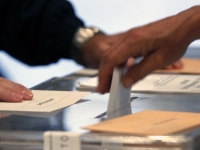Politics
Almost 37.5 million Spaniards are called to the polls this Sunday
To decide which government they want
USPA NEWS -
Almost 37.5 million Spaniards are called to the polls this Sunday in the legislative elections to renew the two chambers of Parliament and choose which party will form the Spanish Government for the next four years. Polling stations will open their doors at 9:00 a.m. and will remain open until 8:00 p.m. Eleven hours with the question of abstention, although in recent weeks the polls have been in charge of underlining the importance of these elections, which can decide the end of the socialist government of Prime Minister Pedro Sánchez and the turn to the right of Spanish politics.
For weeks, public radio and television have insisted on the importance of exercising the constitutional right to vote. There is concern in the political parties that go to the polls: the conservative candidate, Alberto Núñez Feijóo, insistently repeats the need for all those dissatisfied with the policies carried out by the socialist government over the last four years to concentrate their votes on the Popular Party; while the Socialist Party (POSE) and the formations even further to the left of the PSOE insist on the need for leftist voters to mobilize and give their confidence to the Prime Minister Pedro Sánchez or to the extreme left candidates.
But in the electoral campaign for these elections there has been no talk of programs. All the energy has been directed to discredit the opponent, highlighting his mistakes. It is the trend of Spanish politics in recent decades. It was a communist leader, Julio Anguita, who, from the rostrum of the Spanish Parliament, warned, more than 20 years ago, of the need to explain the party programs. Nobody paid attention to him and today, electoral campaigns are dedicated to insulting the opponent, discrediting him and asking for a vote for the charisma of his own leader.
Spanish politics has thus entered a period of warlordism that does not benefit the country at all. Voters are asked to be fanatics capable of voting for their leader without thinking about his successes or his mistakes. And the Spanish media have also entered this game, taking sides with one group or the other, forgetting the most basic rules of journalism. Today, in Spain, voters vote for the most handsome, the one who speaks best or the one who arouses the most sympathy, regardless of his program; and the media defend or reject the candidates based on the interests of their shareholders.
In this scenario, the Spanish will vote this Sunday for the continuity of the Socialist Government of Prime Minister Pedro Sánchez, or a change of course entrusted to the conservative candidate Alberto Núñez Feijóo. At the same time, they will decide if Sánchez will need the support of the Catalan and Basque separatists, and of the extreme left, or if it will be Núñez Feijóo who needs the support of the extreme right. Because what seems clear is that there will be no absolute majority for any party and, although the polls give the conservative candidate an advantage of 5.5 points, other analysts assure that the Government will decide on a small number of votes.
Everything is ready for the Spanish to express their preferences at the polls early this Sunday. After the day of reflection, which the candidates take advantage of to rest and enjoy with their abandoned families, the moment of truth arrives: the moment in which the Spaniards will decide with their votes the course they want for their country for the next four years.
Liability for this article lies with the author, who also holds the copyright. Editorial content from USPA may be quoted on other websites as long as the quote comprises no more than 5% of the entire text, is marked as such and the source is named (via hyperlink).






